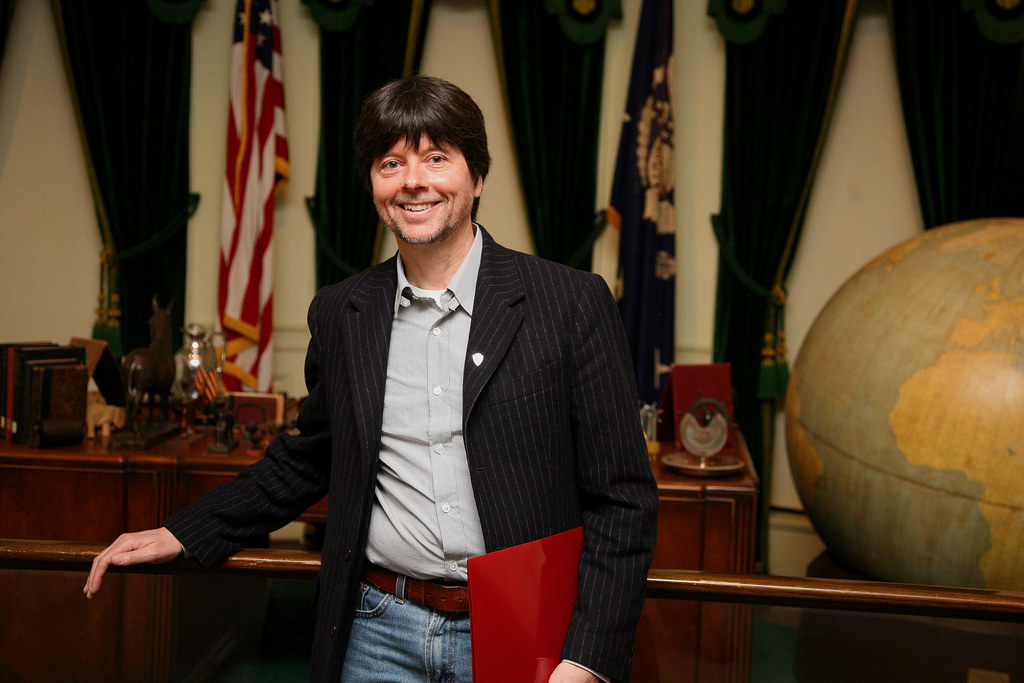As Americans we must acknowledge that our sins are many. Slavery, conquest, the pillage of the environment, inequality--the list hardly bears repeating. But what in our whole storied past have we done to deserve Ken Burns?
 |
| Telling us stories we like to hear. |
Burns has ruined the historical documentary film for at least a generation. His bloated, tear-jerker, The Civil War, was a monster hit that changed the rules of the game. Where before the American Experience documentaries were tight, disciplined 50-minute films, now they became hours-long, multi-part spectacles. Nothing was left on the cutting room floor anymore. “Interview with an old woman who pet LBJ’s beagle in 1960?! Ratings gold! We have 9 hours to fill after all! Go back and see if you can get her to cry.”
Worse than the length and endless digressions of the Burn’s method is the sentimentality. Burns is forever delving into the feelings (or imagined feelings) of the characters rather their motivations and importance. Historians are replaced by poets and political hacks and novelists (and, always, Dayton Duncan), brought in to narrate a history that they barely grasp. The cringe factor is off the charts.
The greatest sin, however, is that Burns is at heart a consensus historian from the 1950s. The Civil War is wrapped up in a “it was all a tragic misunderstanding” narrative that minimizes the ways it was a fight over slavery and white supremacy. The omnipresence of Shelby Foote, with his endless love of the Confederate heroes, drives this home. Lewis and Clark is similarly cursed with serial plagiarist Stephen Ambrose, who knows everything about Meriwether Lewis (except the fact that he was obviously freakin’ gay) and nothing at all about the Indians or even American expansionism. Real scholars of the period like Jim Rhonda and John Allen Logan were barely present, making room for Ambrose, William Least-Heat Moon and Erica Funkhouser--none of whom know much about Lewis and Clark.
Burn’s huge popularity and influence have made his sins viral. Now every damn thing on PBS is a big budget multi-part week-long extravaganza. Some of these are actually not bad. But their very length assures that they will have less cultural relevance. A five-hour series on the French and Indian War airs once, maybe twice, and disappears forever. It is too long for classroom use, and copyright and encryption on the DVDs ensures it will not be edited or remixed into something useful. The old American Experience was devoted to 50-minutes stories that were shown again and again--I can’t tell you how many times I have shared Demon Rum or The Orphan Trains with a college class. The new documentaries do not have a shelf life.
Honestly, someone needs to write a book with the title of this blog post--The Case Against Ken Burns. It will not be me, as such an effort would involve hundreds of hours watching and rewatching his films. So Dear Reader, I give the idea to you. Run with it, I promise to buy the book. In the meantime, I offer a list of some trenchant critiques to get you started:
Ken Burns’ The Civil War
- Toplin [editor], Ken Burns's The Civil War: Historians Respond
- Early parody: The Old Negro Space Program
Ken Burns’ Lewis and Clark
- Cebula, Review of Lewis and Clark
Ken Burns’ Jazz
- Sciabarra, The Subtle Racism of “Jazz”
- Hajdu, Not Quite All That Jazz
- "I Hear America Scatting," by Francis Davis
Ken Burns’ The West as America
Ken Burns’ The National Parks
- Hale, Critiquing Ken Burns
Ken Burns’ The War
- Ken Burns Hates Mexicans (Not actually about Ken Burns but I love the blog title)
- Gage, Old Soldiers Never Lie
Ken Burns’ The Roosevelts: An Intimate Portrait
- Michael Wolraich, Ken Burns and the Myth of Theodore Roosevelt
- Signorile, 'The Roosevelts:' Ken Burns Closets Eleanor, Disappears FDR's Gay Sex-Entrapment Scandal in the Navy
Overall Critiques and Parodies:
